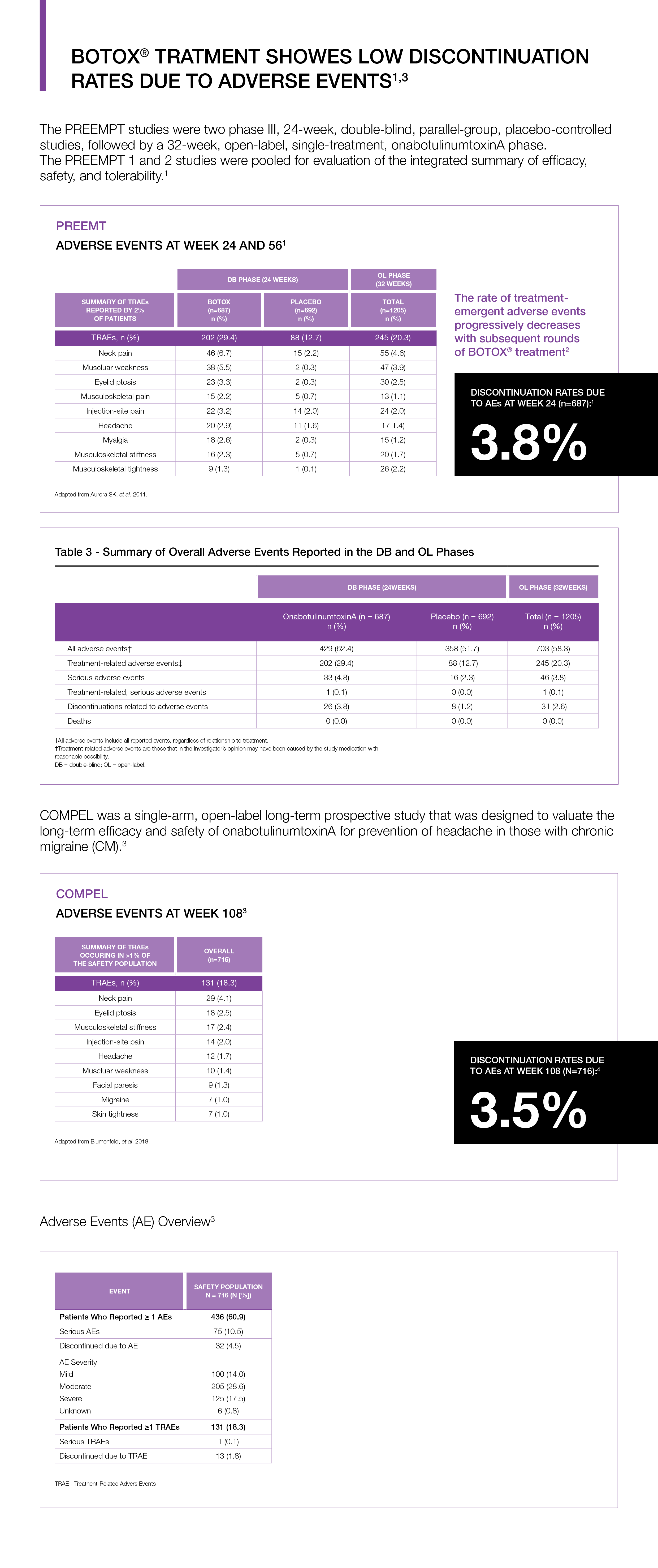Safety Information
DB, double-blind; OL, open-label; TRAE, treatment-related adverse event.
1. Aurora SK, et al. Headache. 2011;51(9):1358–1373. 2. Aurora SK, et al. Acta Neurol Scand. 2014;129:61–70.
3. Blumenfeld AM, et al. J Headache Pain. 2018;19(1):13. 4. Blumenfeld AM, et al. J Neurol Neurosurg Psychiatry. 2019;90(3):353–360.
Abbreviated Safety Summary*
BOTOX® 50/ BOTOX® 100/ BOTOX® 200
Indication: Botox is indicated for Symptom relief in adults fulfilling criteria for chronic migraine (headaches on ≥15 days per month of which at least 8 days with migraine) in patients who have responded inadequately or are intolerant of prophylactic migraine medications
Contraindications: known hypersensitivity to botulinum toxin type A or to any of the excipients (human albumin, Sodium chloride), presence of infection at the proposed injection site(s).
Safety information
Special Population: Elderly patients with significant medical history and concomitant medications should be treated with caution.
Special warnings and precautions: Botox should only be used with extreme caution and under close supervision in patients with subclinical or clinical evidence of defective neuromuscular transmission e.g. myasthenia gravis or Lambert-Eaton Syndrome in patients with peripheral motor neuropathic diseases (e.g. amyotrophic lateral sclerosis or motor neuropathy) and in patients with underlying neurological disorders.
Interactions: Excessive neuromuscular weakness may be exacerbated by administration of another botulinum toxin prior to the resolution of the effects of a previously administered botulinum toxin.
Pregnancy, lactation and fertility: Botox should not be used during pregnancy and in women of childbearing potential not using contraception unless clearly necessary. The use of Botox during lactation cannot be recommended. Studies in male and female rats have shown fertility reductions.
Effects on ability to drive and use machines: Botox may cause asthenia, muscle weakness, dizziness and visual disturbance, which could affect driving and using machines.
Undesirable effects: In general, adverse reactions occur within the first few days following injection and, while generally transient, may have a duration of several months or, in rare cases, longer. Local muscle weakness represents the expected pharmacological action of botulinum toxin in muscle tissue. However, weakness of adjacent muscles and/or muscles remote from the site of injection has been reported. As is expected for any injection procedure, localized pain, inflammation, paraesthesia, hypoaesthesia, tenderness, swelling/oedema, erythema, localized infection, bleeding and/or bruising have been associated with the injection. Needle-related pain and/or anxiety have resulted in vasovagal responses, including transient symptomatic hypotension and syncope. Fever and flu syndrome have also been reported after injections of botulinum toxin. Common reported adverse events include headache, migraine including worsening of migraine, facial paresis, eyelid ptosis, pruritis, rash, neck pain, myalgia, musculoskeletal pain, musculoskeletal stiffness, muscle spasms, muscle tightness, muscular weakness and Injection site pain.
* For full information please see Botox® prescribing information
Full prescribing information can be received from Allergan - Abbvie Biopharmaceutical Ltd., Israel, at 4 Hacharash Street, Hod Hasharon, 4524075. Tel: 09-7909600, Fax: 09-7909606.
IL-BTX-230012 | Mar 2024




